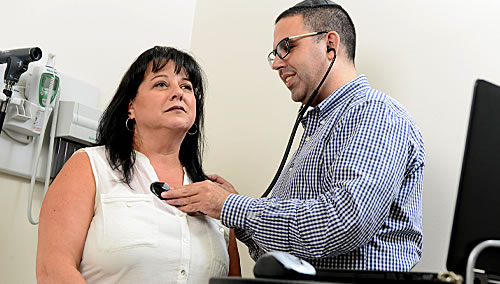 The goal of symptom management is to prevent or treat as early as possible the symptoms of a disease, side effects caused by treatment of a disease, and other problems related to a disease or its treatment. Assisting our patients in continuing their familiar daily activities with the least impact on everyday living is one of our primary goals.
The goal of symptom management is to prevent or treat as early as possible the symptoms of a disease, side effects caused by treatment of a disease, and other problems related to a disease or its treatment. Assisting our patients in continuing their familiar daily activities with the least impact on everyday living is one of our primary goals.
Please read the guidelines below to help you manage various situations that may occur.
IMPORTANT INFORMATION
- One of our physicians is on call 24 hours per day, 7 days per week, 365 days per year.
- While you are on chemotherapy, our goal is to manage your side effects efficiently and avoid unnecessary emergency room visits and hospitalizations.
- Many issues such as nausea, vomiting, low grade fevers, pain control, diarrhea, poor appetite and dehydration can be managed during the day in the office.
- Please be proactive if you are having side effects or problems and call your doctor’s office during normal business hours M-F (after 9 a.m. and before 4 p.m.).
- We would prefer that you call us prior to going to the emergency room except for life-threatening issues such as chest pain, shortness of breath, confusion, or serious bleeding.
- Please read the separate instructions below regarding management of nausea and diarrhea.
- Please be aware that narcotic prescriptions cannot be called into a pharmacy and therefore cannot be filled or refilled on the evenings or weekends.
WHEN YOU SHOULD CALL THE OFFICE
It is very important that you call us as early in the day as possible. This way we can evaluate you in the office and try to avoid a visit to the Emergency Room. Please call us if you develop any of these problems:
- Temperature of 100.5° or higher
- Poor appetite and poor intake of fluids for more than 24 hours
- Nausea, persistent vomiting or inability to keep down liquids
- Diarrhea – 3 or more watery bowel movements per day for 2 or more days which does not respond to Lomotil or Imodium
- Bleeding from the nose or mouth, coughing blood, blood in bowel movements/urine
- Difficulty breathing
- New or worsening abdominal pain
- New swelling in arm(s), leg(s) or neck
- Burning, stinging, redness or swelling where your intravenous (IV) line was placed
- New skin rash
ANTI-NAUSEA MEDICATION REGIMEN
- Compazine (prochlorperazine) 10 mg tablets, 1 tablet every 6 hours as needed
and/or - Zofran (ondansetron) 8 mg tablets, 1 tablet every 8 hours as needed
OR - Kytril (granisetron) 1 mg tablets, 1 tablet every 12 hours as needed (in place of Zofran)
- You may be also asked to take oral Decadron (dexamethesone) with instructions provided by your physician
DIARRHEA MEDICATION REGIMEN
Many chemotherapy drugs can cause diarrhea. Over the counter Imodium or prescription Lomotil can usually control diarrhea if used appropriately. These can be given every 2 hours up to 12 doses per day if necessary. It is important to drink fluids that contain electrolytes and sugar such as Gatorade and non-caffeinated beverages instead of water or tea.
Please call your doctor’s office if your anti-nausea or diarrhea regimen is not working

 When Kim was diagnosed with stage 4 serous carcinoma ovarian cancer on August 9, 2022, she was hospitalized at St. Mary’s—an overwhelming start to a life-changing journey. But from the very beginning, one constant stood out: her connection with Dr. Krista Isaac. “She’s been more than just my oncologist,” Kim said. “She’s been a constant source of comfort, someone who listens to my fears, answers every question, and truly looks out for me.”
When Kim was diagnosed with stage 4 serous carcinoma ovarian cancer on August 9, 2022, she was hospitalized at St. Mary’s—an overwhelming start to a life-changing journey. But from the very beginning, one constant stood out: her connection with Dr. Krista Isaac. “She’s been more than just my oncologist,” Kim said. “She’s been a constant source of comfort, someone who listens to my fears, answers every question, and truly looks out for me.”